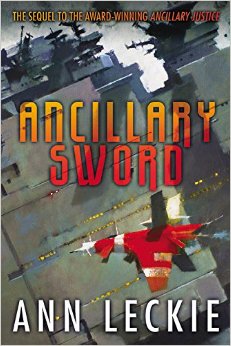Ann Leckie’s debut novel, Ancillary Justice, has won six awards—latest and not least the Hugo Award for Best Novel—and appeared on the shortlists for at least two more. After such a successful first outing, the major question with Ancillary Sword has to be: how does it compare? Has Leckie caught the same lightning in a bottle twice?
I loved Ancillary Justice. For me, it was one of those books you’ve wanted to read your whole life, an empty gap where you didn’t realise how wide a gap existed for it to bridge until you read it. I had a very strong positive emotional response to Ancillary Justice, is what I’m saying.
Only time will tell whether Ancillary Sword achieves the same success in the wider world, but for me? It already has. It turns out that I love Ancillary Sword just as much as its predecessor, if not more.
Having survived the events of Ancillary Justice, Breq now finds herself in the unlikely position of reluctant ally to (one faction of) the Lord of the Radch, multi-bodied Anaander Mianaai. Given a ship—the Mercy of Kalr—together with the rank of Fleet Captain and the remit to maintain order in the system of Athoek, Breq has new complications to navigate. Between Anaander’s attempts to keep her on some kind of leash, the long-laid and hidden plots of the Lord of the Radch’s conflict with herself, the problems of steering a course through the power politics local to Athoek, and keeping the system stable, Breq has a lot on her plate.
Ancillary Sword is a more introspective book than its predecessor. Where Ancillary Justice married thriller and space operatic modes, here we have much more an extended meditation on power, and identity, and morality: a book about coming to a new place and finding yourself entangled in its politics and injustices old and new. In many respects Ancillary Sword mirrors the thematic movements of Ancillary Justice on a more intimate scale: it interrogates the imperialism of its setting, and holds up to scrutiny the usually-unexamined colonialism of so much space opera. Within Ancillary Sword, too, thematic concerns mirror themselves across several layers of the narrative: we see echoes of Anaander Mianaai’s treatment of Breq’s young Lieutenant Tisarwat in the situation of the inhabitants of Athoek Station’s Undergarden, and in that of the workers shipped in to labour on the tea plantations on the planet itself.
And here, now that we are accustomed to the author’s choice of Radchaai pronouns, and the Radchaai world and its context, does the text finally get a chance to explore some of what it means to be a person who was once a ship; who was once multi-bodied and now is not; who stands both with, and apart from, the dominant ways of thinking and perceiving in their society. Through the contrast between Breq commanding a ship and Breq having been the Justice of Toren; through Breq’s present limitations, and her interactions with other characters like Tisarwat and Mercy of Kalr (and Seivarden, whom readers will recall from Ancillary Justice) we get a sense of how complicated the notion of personhood and identity might be—and how constrained they can be by circumstance.
Structurally, Ancillary Sword falls prey to a certain amount of Middle Book Problem. More introspective than Ancillary Justice, and without Ancillary Justice’s parallel past and present strands, its narrative feels slower: it arrives at its climax with less organic inevitability. The elements it introduces—a Translator for the Presger, the race of incomprehensible but very powerful aliens who completely outmatch the Radchaai technologically and militarily; a smuggling operation that may or may not involve one or more of Anaander Mianaai’s conflicting factions; Breq’s newfound power and administrative responsibility—alongside the ongoing problem of Anaander Mianaai and the Radchaai civil war, hint at stories too wide to be easily resolved in a single final volume to this trilogy.
It may be that what I’m seeing here in the breadth and depth of field and potential for more stories in Leckie’s worldbuilding. Because while the majority of the action—and if I have implied that Ancillary Sword lacks action, I wrong it: it might be a touch introspective, but things still go BOOM—takes place in a single star system, the scope of Leckie’s story calls back the old-fashioned galaxy-spanning space opera of the pulps,* and the consequences of actions within the story scale between the intensely local and personal,** and the star-spanning.
*Or of my own introduction to science-fiction-in-space, the Star Wars novels of Timothy Zahn.
**That’s how you make a rape a)non-exploitative and b)integral to part of your plot.
It’s the world and the characters that are the front-and-centre attraction of Ancillary Sword—that, and Leckie’s ability to interrogate and complicate the default narratives of space opera while still telling a fun, accessible story. It’s an excellent book, one that more than lives up to Leckie’s debut promise—indeed in my view, surpasses it.*
*Intensely positive emotional reaction, remember.
opens in a new window![]() I read it in a single sitting, and damn, I want more.
I read it in a single sitting, and damn, I want more.
Ancillary Sword publishes October 7th from Orbit.
Liz Bourke is a cranky person who reads books. Her blog. Her Twitter.










